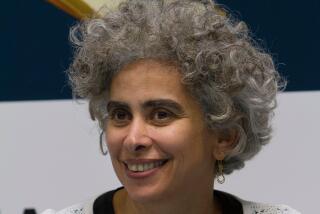Nobel Group Dismisses Menchu Flap
- Share via
MEXICO CITY — The human rights foundation led by Rigoberta Menchu and the committee that awarded her the Nobel Peace Prize responded Tuesday to a report claiming key details of her autobiography were fabricated.
Both said the controversy had no bearing on either her work or the prize.
A new book by anthropologist David Stoll claims that “I, Rigoberta Menchu,” first published in 1983, “cannot be the eyewitness account it purports to be” because she repeatedly describes “experiences she never had herself.”
Details of Stoll’s work were published today in the New York Times. Stoll, a professor at Middlebury College in Vermont, did not respond to telephone messages left at his office.
Menchu was not available for comment.
Menchu became an internationally acclaimed spokeswoman for the rights of indigenous people, based largely on her bestselling account of her life. She won the Nobel Peace Prize in 1992.
Alfonso Alem, executive director of the Rigoberta Menchu Foundation in Mexico City, said the claims made by Stoll “should not affect the legitimacy of the demands of the Indian people.
“This is a cause that the world recognizes as legitimate--not because of Rigoberta Menchu.” He said he had understood Menchu’s book in two ways: “One in a literal manner, one in a symbolic manner--and this absolutely has not been affected.”
Stoll’s book, “Rigoberta Menchu and the Story of All Poor Guatemalans,” is based on archival research and nearly a decade of interviews with more than 120 people, the paper said. In September, the paper said, Menchu refused to address Stoll’s criticisms, dismissing them as part of a racist political agenda intended to gain publicity.
Some of Menchu’s relatives, neighbors, friends and former classmates reportedly said main episodes of her book had been fabricated or exaggerated.
A land dispute, central to the book, was a family quarrel, they said, not a fight against rich landowners. A younger brother who Menchu said starved to death never existed, they said. And Menchu, who claimed she never went to school, attended two private boarding schools on scholarships, they said.
Francis Sejersted, chairman of the Norwegian Nobel Committee, said his group was aware of the criticisms of Menchu’s autobiography and that they would have no effect on the peace prize.
“This has come up before,” Sejersted said in Oslo, Norway. “We have noted that some new information has come out. But we did a very thorough investigation before the prize, and none of this undermines--from our side--her efforts.”
Even if the committee wished to revoke a prize, there is no provision in the Nobel rules for doing so.
More to Read
Sign up for Essential California
The most important California stories and recommendations in your inbox every morning.
You may occasionally receive promotional content from the Los Angeles Times.













